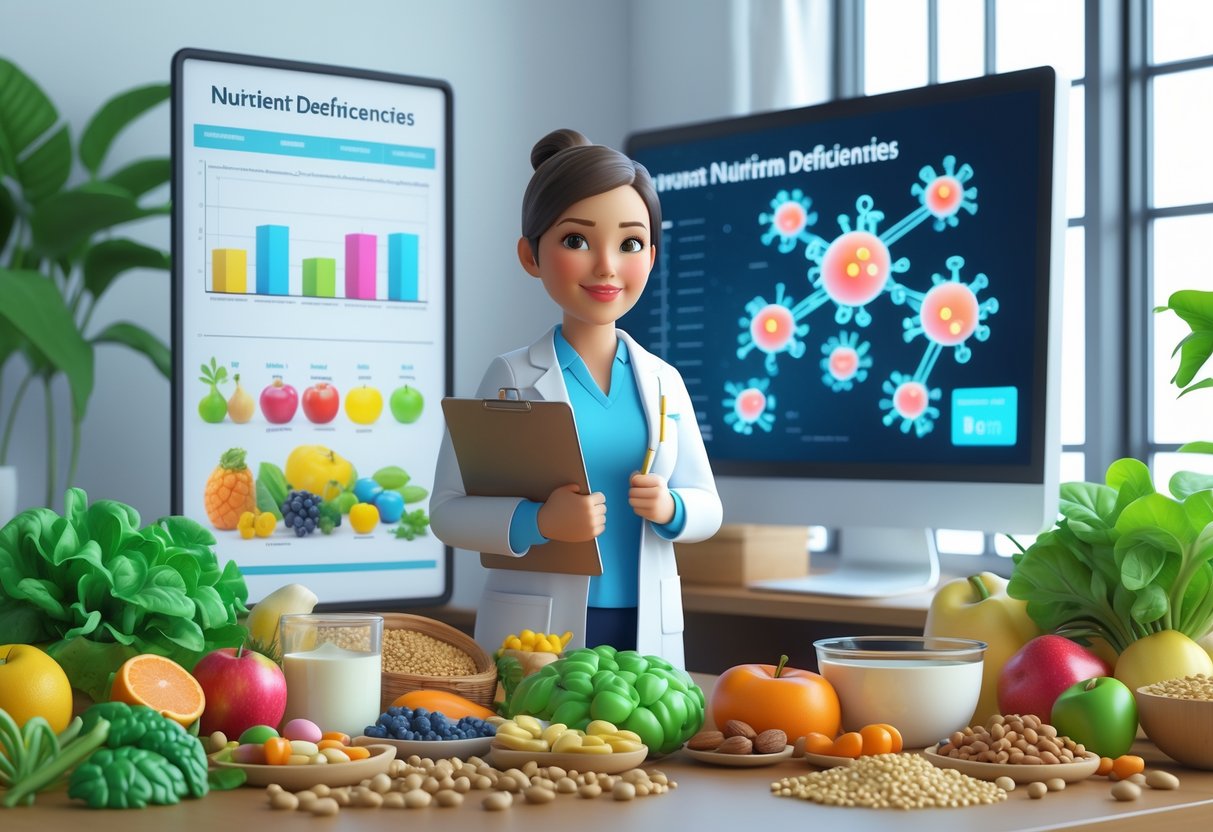Nutritionist Importance: Why Expert Guidance Matters for Your Health
Updated On: October 23, 2025 by Aaron Connolly
Defining the Nutritionist Role
When you understand the different types of nutrition professionals, it gets easier to pick the right expert for your goals.
Each role comes with its own training and expertise, so you’ll want to know who does what.
Nutritionist Versus Dietitian Explained
People often use “nutritionist” and “dietitian” like they mean the same thing, but honestly, the differences are important.
Dietitians are regulated healthcare pros. They finish accredited programs and register with the Health & Care Professions Council (HCPC).
Dietitians can work alone with patients who need medical nutrition help. They handle therapeutic diets in hospitals and manage nutrition treatment for things like diabetes or heart disease.
Nutritionists aren’t regulated in the same way. They give evidence-based nutrition advice to individuals or groups, but can’t provide medical nutrition therapy on their own.
Registered Nutritionists might work with people who have pre-existing conditions, but they don’t treat those conditions directly. They have to team up with healthcare providers if the situation gets clinical.
The biggest difference? Dietitians treat medical conditions with nutrition, while nutritionists mostly focus on general wellness and health promotion.
Understanding Registered Dietitians (RD, RDN)
Registered Dietitians hold RD or RDN credentials—Registered Dietitian or Registered Dietitian Nutritionist.
Both mean the same thing when it comes to qualifications and expertise.
To become an RD or RDN, you need a bachelor’s degree from an accredited program.
Then there’s a supervised internship—over 900 hours, which is no joke.
Finally, everyone sits for a national registration exam.
You’ll find RDs and RDNs working in:
- Hospitals and clinics
- Sports nutrition programs
- Private practices
- Research labs
- Government health departments
They have to keep learning to maintain their credentials, so they stay updated on the latest nutrition science.
RDs and RDNs can offer medical nutrition therapy, which means they design eating plans to manage diseases.
They’re also qualified to work in intensive care and support critically ill patients.
Key Skills and Professional Qualifications
Good nutritionists mix scientific know-how with real communication skills.
They need to understand biochemistry, physiology, and the way nutrients impact our bodies.
Strong analytical skills help them spot dietary patterns and figure out what’s missing.
Key qualifications include:
- Honours degree in nutrition science (at least)
- Evidence-based practice training
- Ethics certification
- Ongoing education
Communication matters as much as science.
Nutritionists have to explain tricky concepts in ways clients can actually use.
They need to listen—really listen—to individual needs and preferences.
Registered Associate Nutritionists (ANutrs) have degree-level knowledge but not much experience yet.
Registered Nutritionists (RNutrs) have more years under their belt and have shown they’re competent in their specialties.
Many nutritionists pick a focus area.
Some work with athletes, others in public health, and some dive into paediatric nutrition or eating disorder support.
Professional registration with groups like the Association for Nutrition proves they meet standards and follow strict ethics.
How Nutritionists Impact Your Health
Nutritionists can actually change your health by helping you build healthy eating habits, checking your nutritional status, and creating personalised meal plans.
They work alongside you to tackle health challenges and find food solutions that fit your life, not someone else’s.
Promoting Healthy Eating Habits
A nutritionist helps you build habits that actually last.
They show you which foods give you energy and which ones might mess things up.
Lots of people struggle with food choices because, honestly, nutrition can get confusing.
Nutritionists break it down simply—no jargon.
They’ll show you how to read food labels.
Fat has 9 calories per gram, carbs have 4. Knowing this makes shopping less overwhelming.
A few quick wins: • Learning your best portion sizes • Finding healthy swaps for your favorites • Planning meals so you’re not starving at weird times
Nutritionists also help you get past your own roadblocks.
If you’re always in a rush, they’ll suggest fast meal ideas.
On a budget? They’ll point out affordable, nutritious foods.
The point isn’t perfect eating—it’s about habits you can actually stick with, without feeling boxed in.
Assessing Nutritional Status
Your nutritional status shows if you’re getting enough vitamins, minerals, and other essentials.
A nutritionist can spot gaps in your diet you didn’t even know you had.
They look at what you eat, your health, and your lifestyle.
This can explain why you feel tired, get sick often, or have trouble managing your weight.
Some common red flags: • Low energy all day • Getting sick a lot or healing slowly • Hair loss or brittle nails • Digestive issues
A nutritionist might ask you to track your food for a week.
This gives them a real look at your eating habits.
They’ll spot missing nutrients or patterns that need tweaking.
They’ll also consider your age and activity level.
A 50-year-old with diabetes? Different needs than a 25-year-old athlete.
Sometimes, blood tests reveal vitamin shortages or other issues.
Your nutritionist will explain these results and suggest foods to help.
Personalising Nutrition Plans
Everyone needs a different approach.
A nutritionist builds a plan that fits your goals, tastes, and daily routine.
Your personalised plan takes a bunch of things into account:
| Factor | Why It Matters |
|---|---|
| Health conditions | Diabetes needs different foods than heart disease |
| Food allergies | Gluten intolerance means no wheat |
| Budget | You don’t need pricey superfoods to eat well |
| Cooking skills | Simple recipes beat complicated ones for most people |
| Family situation | Your plan has to work at home, too |
It’s not a strict diet.
It’s a flexible guide that changes with you.
If you can’t stand veggies, a nutritionist finds other foods you’ll actually eat.
They’ll help with meal timing and prep, too.
Some folks do better with smaller, frequent meals. Others like three big ones.
Your plan should evolve as your health and needs change.
Regular check-ins keep you moving forward and motivated.
Heads up: If a nutritionist hands out the same plan to everyone, that’s a red flag.
Good advice is always tailored to you.
Individualised Nutrition Plans and Meal Planning
Personalised nutrition is all about your unique needs, preferences, and lifestyle.
Forget generic diets—modern meal planning looks at your genetics, lab results, cultural background, and even how much time you have to cook.
Customising Meal Plans for Unique Needs
Good meal planning starts with understanding what you actually need.
Your age, activity level, health conditions, and food likes all shape your nutrition.
A solid nutrition plan starts with your medical history.
Someone with diabetes will need different carb timing than someone managing heart disease.
Food allergies or intolerances matter too.
Personalisation factors to consider:
- Your health conditions and any meds
- Religious or cultural food rules
- How much you can spend and your cooking comfort
- Time for meal prep
- What you love (and hate) to eat
Your lifestyle matters a lot.
Busy people might need grab-and-go breakfasts, while athletes need more calories and protein.
A nutritionist can build plans that fit your schedule, not just your diet.
The best meal planning uses technology to track progress.
Plans can change as your body responds.
Importance of Diverse Nutrient Intake
Your body needs more than 40 nutrients to run well.
Getting enough variety takes some planning.
The main nutrient groups:
- Carbs for energy
- Protein for muscles
- Fats for hormones
- Vitamins for your immune system
- Minerals for your bones
- Water, because hydration matters
No single food covers it all.
That’s why meal planning mixes things up.
Breakfast might give you B vitamins, while dinner veggies load you up with vitamin C and minerals.
Eating with the seasons keeps things interesting and cheaper.
Spring greens have different nutrients than winter root veggies.
A good nutritionist rotates foods so you don’t miss anything.
If you don’t get enough variety, you’ll notice.
Fatigue, weak immunity, and slow healing are often signs you’re missing something in your meals.
Supporting Weight Loss and Management
Working with a nutritionist gives you structure and expert support, making weight loss feel less overwhelming.
You’ll avoid common mistakes and learn habits that actually stick for the long run.
Expert Guidance for Weight Loss
A qualified nutritionist brings real strategies to your weight loss journey.
They check out your eating habits, health status, and lifestyle to create a plan that fits you.
Studies show people working with dietitians lose about 1 kg more than those going it alone.
It’s not just about eating less—it’s about understanding nutrition, portions, and meal timing.
Your nutritionist will spot trouble spots in your diet.
Maybe you’re eating more calories than you think, or your meals aren’t balanced.
Some key ways they help:
- Calculating your calorie and nutrient needs
- Building meal plans that keep you full
- Teaching portion control without making you weigh everything
- Helping you identify foods that trigger overeating
Accountability really matters.
Regular check-ins help you stay on track, especially when motivation dips.
Your nutritionist tweaks your plan as you go.
They’ll also talk about emotional eating.
A lot of us eat out of stress, boredom, or habit.
A nutritionist helps you spot your triggers and find better ways to cope.
Long-Term Strategies for Weight Management
Weight management isn’t just about hitting your goal weight.
A nutritionist teaches habits that help you keep the weight off, which is tough—80% of people regain weight without professional support.
They focus on changing behaviors, not just cutting foods.
This means you’ll learn to enjoy healthy options, listen to hunger cues, and add flexibility to your meals.
Your nutritionist helps you set realistic goals.
Real weight loss usually happens at 0.5–1 kg per week—forget those crash diets.
Long-term success comes from:
- Rotating meals you actually like
- Planning for parties, holidays, or busy times
- Having backup ideas when life gets hectic
- Adjusting portions if your activity level changes
Maintenance is a different skill set than losing weight.
Your nutritionist will show you how to slowly add calories while keeping your weight steady.
They’ll also help you find rewards and motivation that aren’t food.
That way, you don’t fall back into old habits.
Even monthly follow-ups can make a big difference in long-term success.
Ongoing support helps you handle challenges before they throw you off track.
Addressing Chronic Illnesses and Diseases

Nutritionists play a big role in managing long-term health conditions with targeted diet strategies.
They create personalised meal plans to help control blood sugar in diabetes or reduce strain on kidneys in renal disease.
Managing Diabetes with Nutrition
Medical nutrition therapy forms the foundation of diabetes care. We work directly with patients to build eating habits that help keep blood glucose levels steady throughout the day.
Key strategies include:
- Counting carbohydrates to match insulin doses
- Timing meals to avoid blood sugar spikes
- Picking high-fibre foods that slow down glucose absorption
Diabetes nutrition really comes down to portion control, not banning foods altogether. We teach patients how to read food labels and spot hidden sugars in processed foods.
Plenty of people with type 2 diabetes can lower their need for medication just by eating better. Even losing 5-10% of body weight can make a big difference in blood sugar control.
Sample meal timing:
- Breakfast: 7-8am
- Mid-morning snack: 10am
- Lunch: 12-1pm
- Afternoon snack: 3-4pm
- Dinner: 6-7pm
We also help with complications like diabetic kidney disease. This means cutting back on protein while still getting enough nutrients for wound healing.
Supporting Kidney Disease Patients
Kidney disease patients need to watch their protein, sodium, potassium, and phosphorus intake closely. We set up meal plans that lower waste build-up in the blood and still prevent malnutrition.
Essential dietary changes include:
- Protein restriction: 0.6-0.8g per kg body weight for stage 4-5 disease
- Sodium limits: Under 2g daily to help control blood pressure
- Potassium management: Avoiding foods high in potassium like bananas and oranges
We show patients how to cook without salt by using herbs and spices instead. Reading nutrition labels matters a lot since processed foods hide sodium and phosphorus.
Foods to limit:
- Dairy products (high phosphorus)
- Nuts and seeds (high potassium and phosphorus)
- Processed meats (high sodium)
In advanced kidney disease, patients often need to limit fluids. We help them track every drink and even the water in foods.
Blood tests guide our nutrition advice. As kidney function shifts, we change up the diet plan to keep health on track.
Preventing Nutrient Deficiencies

We can dodge serious health issues by catching nutrient gaps early and knowing how poor nutrition messes with our bodies. The best approach blends smart food picks with an understanding of which vitamins and minerals matter most.
Identifying and Addressing Vitamin and Mineral Deficits
We all need to look out for signs our bodies aren’t getting enough essential nutrients. The most common deficiencies affect millions worldwide.
Iron deficiency can make you tired, weak, and foggy. Women, vegetarians, and pregnant women face higher risks. You can help prevent this by eating:
- Red meat and poultry
- Dark leafy greens like spinach
- Beans and lentils
- Fortified cereals
Vitamin D deficiency weakens bones and makes infections more likely. Sunlight gives us vitamin D, but a lot of people need supplements, especially in the winter.
Vitamin B12 deficiency hits the nervous system. B12 mostly comes from animal foods like meat, fish, eggs, and dairy. If you’re vegetarian or vegan, you probably need a supplement.
Try to eat a mix of nutrient-rich foods every day. If food alone doesn’t cut it, supplements can help, but it’s smart to check with a healthcare provider first.
Understanding the Risks of Poor Nutrition
Poor nutrition touches every part of our health, from childhood through old age. Nutrient deficiencies can sneak up on you and cause real trouble.
If you don’t get enough vitamins and minerals, you might end up with:
- A weaker immune system
- Slow wound healing
- Bad bone health
- Mental health struggles
- Higher risk of disease
Kids with nutrient gaps might not grow as they should. Adults can wind up with chronic conditions like heart disease, diabetes, or osteoporosis.
Micronutrients work together in the body. If you’re missing one, others might not work right. Take vitamin C and iron, for example—you need vitamin C to absorb iron well.
Eating from all food groups—fruits, veggies, whole grains, lean proteins, and dairy—covers your bases. That way, your body gets the full spread of vitamins and minerals it needs to stay strong and fight off illness.
Allergies and Special Dietary Needs

People with food allergies need careful nutrition planning to stay healthy and avoid risky foods. A good nutritionist can create safe meal plans that meet all nutritional needs without triggering allergies.
Managing Food Allergies and Intolerances
Food allergies affect about one in ten people worldwide. The usual suspects are milk, eggs, wheat, nuts, fish, and shellfish.
Nutritionists help sort out which foods cause problems by going over detailed food histories. They team up with doctors to figure out which foods you need to avoid.
Key things nutritionists tackle:
- Reading labels to catch hidden allergens
- Finding safe swaps for off-limits foods
- Preventing nutrition gaps from restricted diets
- Teaching families about cross-contamination
Kids with multiple allergies face extra risks for poor growth. Studies show allergic kids often eat less energy than their peers, and some even end up overweight from limited choices.
Nutritionists keep an eye on growth and look for signs of vitamin or mineral shortages. Regular check-ins help catch problems early.
The big goal is to keep the diet as varied and balanced as possible, even with restrictions. This eases family stress and supports normal development.
Crafting Safe Meal Plans
Nutritionists need to know their stuff about food composition and cooking methods to build safe meal plans. They personalise every plan based on someone’s specific allergies.
Key planning steps:
- Substitute mapping: Swapping banned foods for safe, similar ones
- Cross-contamination prevention: Using separate prep areas and utensils
- Emergency protocols: Clear steps for accidental exposure
- Growth monitoring: Checking kids’ weight and height regularly
For severe allergies, nutritionists might suggest hypoallergenic formulas or supplements. They make sure you get enough protein even if things like milk or eggs are off the table.
Meal plans have to work for real life. Nutritionists think about cooking skills, budgets, and cultural food preferences. They give out practical shopping lists and simple recipes.
Regular follow-ups let plans change as needs shift. Kids might outgrow one allergy and develop another. Nutritionists adjust the plan to keep it safe and nutritious.
Sports Nutrition and Performance

Athletes need the right fuel to compete at their best. Sports nutrition brings science-backed strategies that can boost energy, speed up recovery, and help athletes stay in top form through long seasons.
Nutritional Strategies for Athletes
Sports nutrition isn’t just about eating healthy. We need to match food choices to training and competition schedules.
Macronutrient timing matters a ton for athletes. Carbs fuel hard training and should make up 45-65% of calories. Protein helps muscles repair and grow, with athletes needing 1.2-2.0 grams per kilogram of body weight daily.
Pre-workout meals work best 1-2 hours before exercise. Athletes should grab easy-to-digest carbs and a little protein. Something like a banana with peanut butter or porridge with berries really does the trick.
During exercise, hydration becomes the main focus. For workouts over an hour, sports drinks help replace lost electrolytes and give quick carbs.
Right after training, muscles soak up nutrients best in the first 30 minutes. The sweet spot is a 3:1 or 4:1 carb to protein ratio—chocolate milk actually works great here.
Athletes also need more vitamins and minerals than most folks. Iron helps carry oxygen, while B vitamins turn food into energy.
Balancing Energy and Recovery
Nailing energy and recovery makes or breaks athletic progress. Energy needs swing wildly between sports and training phases.
Endurance athletes like cyclists need 6-10 grams of carbs per kilogram each day. Strength athletes focus more on protein—up to 2 grams per kilogram—to build muscle.
Recovery nutrition starts right after training. The body needs to refill glycogen and fix muscle damage. Miss this window and you risk slower progress and more injuries.
Good nutrition timing can even improve sleep quality. Skipping caffeine six hours before bed and having a small protein snack helps overnight recovery.
Hydration strategies depend on how much you sweat. Athletes might lose 1-3 litres an hour in tough sessions. Even mild dehydration—just 2%—hurts performance.
Supplement timing matters too. Creatine works best when you take it every day, not just around workouts. Caffeine peaks 30-60 minutes after you take it, so timing counts.
Smart athletes track their nutrition and adjust it for training load, competitions, and how their own bodies respond.
Disease Prevention Through Nutrition

Good nutrition really is your body’s first line of defence against chronic diseases like heart disease, type 2 diabetes, and high blood pressure. Eating a balanced diet gives your immune system what it needs and cuts down on the inflammation that leads to illness.
Nutrition’s Role in Reducing Risks
Cardiovascular Disease Prevention
Loading up on fruits, veggies, and whole grains can seriously lower your heart disease risk. These foods are packed with antioxidants that protect your arteries.
Cutting back on saturated fats and processed foods keeps cholesterol under control. Swapping red meat for fish twice a week is a simple but effective change.
Type 2 Diabetes Control
Eating well helps regulate blood sugar and stops insulin resistance before it starts. Focus on complex carbs like brown rice and quinoa, not the refined stuff.
Key nutrients for disease prevention:
- Fibre – brings down cholesterol and helps keep blood sugar steady
- Omega-3 fatty acids – protect your heart
- Antioxidants – fight cell damage and inflammation
Eating regular meals with balanced portions keeps your energy stable and helps avoid blood sugar spikes.
Long-Term Health Benefits
Immune System Strengthening
A balanced diet keeps your immune system humming along. Vitamin C from citrus and zinc from nuts help you fight off infections.
Getting enough protein helps you keep muscle as you age. This lowers your risk of falls and broken bones later on.
Metabolic Health Improvements
Building good nutrition habits early pays off for years. What you eat growing up shapes your future health.
Long-term advantages:
- Lower blood pressure
- Less inflammation
- Easier weight management
- Stronger bones and muscles
A registered dietitian can tailor a plan to your lifestyle and health needs, helping you get the most out of disease prevention through nutrition.
Education and Empowerment for Healthier Choices

Nutrition education gives people the knowledge and confidence to make better food choices every day. When we mix this learning with real accountability systems, it can lead to lasting change—definitely more than just a quick fix.
The Impact of Nutrition Education
Nutrition education changes the way we see food by breaking down confusing nutrition science into simple, doable steps. Studies show people with solid nutrition education eat more fruits and veggies and cut back on processed foods.
We see the best results when education focuses on practical skills. Teaching people how to read labels, plan meals, and cook healthy basics gives them tools they’ll actually use.
Community-based programmes work especially well because they connect learning to real-life resources. Learning alongside friends and family just makes new habits stick better.
The most effective education uses a mix of approaches:
- Hands-on cooking classes for real-world skills
- Group discussions to share tips and stories
- Visual aids like portion guides and meal planners
- Take-home resources to reinforce what you learn
Workplace and school studies show people remember nutrition info better when they practice it right away. That’s why great programmes always include activities like meal prep or grocery shopping tours.
Boosting Motivation and Accountability
Motivation really sticks when you tie healthy eating to something personal. Maybe you want more energy for your day or need to manage a health issue—connecting nutrition to what matters helps you stay on track.
Accountability gives you the support you need to turn intentions into habits. It’s easier to get results when you check in regularly with a nutritionist, a support group, or even family who share your goals.
Effective accountability means:
- Regular progress reviews so you can celebrate wins and tackle challenges
- Goal-setting sessions that break things down into doable steps
- Problem-solving support when you hit bumps in the road
- Peer connections with others working on similar changes
People who work with nutrition pros tend to keep up healthy eating habits longer. Expert guidance and steady support really make change possible.
Apps can help too—tracking meals or joining online groups for recipes and encouragement. But honestly, nothing beats human connection for lasting change in eating habits.
Ongoing Support and Monitoring From Nutrition Experts

Nutrition therapy works best when you get consistent support from trained professionals. Dietitians and nutritionists follow up with you to see how things are going and tweak your plan as needed.
Regular Check-Ins and Progress Tracking
Weekly sessions make the most impact during the first six weeks of a nutrition plan. After that, monthly visits help you keep moving forward without crowding your calendar.
In these check-ins, you and your dietitian review your food journal and talk about anything that’s been tough. They track things like your weight, energy, and how closely you’re following the plan.
Progress isn’t just about the scale. Your care team also looks at:
- Blood work for vitamin D, B12, and iron
- How your energy changes during the day
- Sleep quality
- How you manage stress eating
Phone consultations help you stay connected between appointments. Research even shows these calls can keep you on track by catching issues early.
Most follow-up visits only take about 15 minutes. Quick check-ins make it easier to stay accountable without messing up your routine.
Your care team spots nutrition problems before they get serious. They notice early warning signs and recommend supplements if you need them.
Adapting Guidance as Needs Evolve
Life changes, and your nutrition plan should too. Dietitians adjust meal plans when your work schedule, health, or fitness goals shift.
Contract-based agreements set clear goals for you and your nutritionist. These plans outline what you want to achieve and when you’ll check your progress.
Holidays, travel, and work stress can all mess with your eating. Regular follow-ups help you build strategies for these situations before they throw you off.
Your nutritionist updates your plan based on what’s actually working for you. This personal approach always beats a generic diet.
Evidence-based practice means your care team uses what research shows actually works. They gather info over time to make the best decisions for your plan.
Video calls let you meet face-to-face without leaving home. That way, you can keep in touch with your dietitian, even when life gets busy.
If you’re managing a chronic condition like diabetes, you’ll need ongoing tweaks to your diet. Regular monitoring helps prevent problems and keeps your treatment on track.
Frequently Asked Questions

People usually have a lot of questions before seeing a nutritionist or dietitian. They want to know what happens during visits, how these experts can help, and what the long-term benefits are.
What can I expect when visiting a nutritionist for weight management?
Your first visit starts with a deep dive into your eating habits and health history. The nutritionist will ask about what you eat, your daily routine, and your goals.
They’ll put together a meal plan that suits your lifestyle. This isn’t about strict dieting—it’s about making changes you can actually keep up.
You’ll learn about portion sizes and which foods help with healthy weight loss. The nutritionist also shows you how to read food labels and make better choices when you eat out.
Follow-ups help you track progress and tweak your plan as needed. Most folks see their nutritionist every 2-4 weeks while actively working on weight.
How can a nutritionist assist me with dietary concerns specific to my health needs?
Nutritionists help manage lots of health conditions with food changes. They work with people who have diabetes, heart disease, digestive issues, or food allergies.
For diabetes, they’ll explain how to count carbs and keep your blood sugar steady. They’ll help you balance your meals so your glucose stays in check.
If you have digestive problems, they’ll help you spot foods that trigger symptoms and suggest swaps. Sometimes, they use elimination diets to figure out what’s causing trouble.
For food allergies, they help you find safe substitutes so you don’t miss out on nutrition. They make sure your diet covers all your needs, even with restrictions.
In what ways do dietitians contribute to patient care in hospitals?
Hospital dietitians are part of the medical team, helping patients recover faster. They figure out what each patient needs based on their health and treatment.
They create special diets for different conditions. Maybe it’s low sodium for heart patients or more protein for someone healing after surgery.
Dietitians also support patients who have trouble eating or swallowing. They work with doctors to decide if someone needs a feeding tube or supplements.
Before patients leave, dietitians teach them about any diet changes they’ll need at home. This helps prevent trips back to the hospital and supports better recovery.
What are the benefits of consulting with a nutritionist for maintaining overall wellness?
A nutritionist helps you build healthy habits that stick. They show you how to plan balanced meals and make good choices every day.
You’ll find out how different foods affect your mood and energy. That way, you can pick foods that help you feel your best.
Nutritionists spot gaps in your diet before they turn into bigger problems. They might recommend foods rich in certain vitamins or suggest a supplement if you need it.
Regular check-ins keep you moving toward your goals. Having a professional in your corner makes it much easier to keep up with healthy changes.
Could you explain the role of a dietitian within the community health framework?
Community dietitians work to boost the health of whole neighbourhoods and groups. They run nutrition education programs at schools, community centres, and local organisations.
Sometimes, they teach cooking classes so families can make healthy meals on a budget. These hands-on sessions give people skills they’ll actually use.
Dietitians also team up with food banks and meal programs. They make sure these services offer nutritious options for those who need them.
They join forces with other health pros to tackle big nutrition issues in the community. This might mean working on projects to cut childhood obesity or improve access to fresh food.
How might the support from a dietitian impact long-term dietary habits?
When you work with a dietitian, you start to notice why some foods leave you feeling better than others. That kind of insight can really push you to stick with healthier choices, even after your visits are over.
Dietitians show you how to tackle everyday eating challenges. You’ll pick up ways to deal with social gatherings, hectic days, and those pesky cravings—without feeling like you’re missing out.
Getting regular support can boost your confidence around food decisions. After a while, making healthy choices just feels natural; you don’t have to overthink it.
People often find that having someone to check in with keeps them honest about their goals. Knowing you’ll talk through your progress with a pro? That can be surprisingly motivating.

